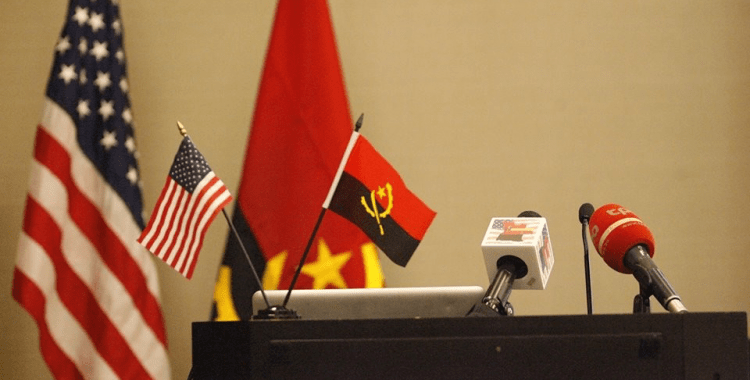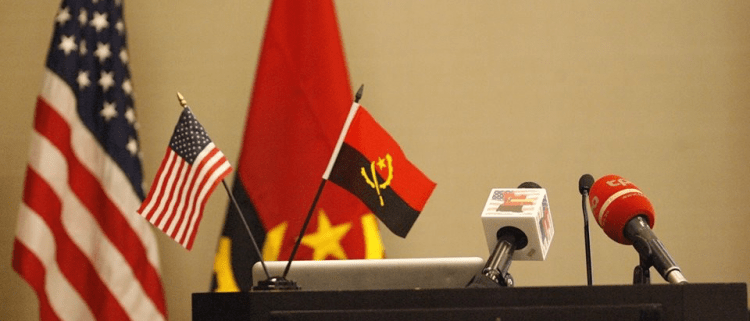2022 Angolan elections and the United States

Recently, rumors have circulated in Luanda and received echo in generally well-informed portals[1] about a possible increased interest of the United States in the Angolan elections, which would lead the Western power to demand that the elections have impartial international observers to guarantee the electoral truth, as well as the threat of possible sanctions against the João Lourenço government if it did not comply with these American recommendations. Specifically, it is announced that the Biden Administration has been threatening the application of financial sanctions, visa restrictions and travel bans against government officials who undermine elections in their countries[2]. From there it is extrapolated that it will be doing the same in relation to Angola.
This apparent position represents a break with the relative passivity with which the United States of America in the past has faced the general elections in Angola, at least since 2008, it is necessary to try to understand if this change in US policy verifiably exists and in what terms.
Firstly, the sources we consulted state that they are not aware of any reversal of US foreign policy towards Angola, noting that the rumors essentially originate from documents sent by Angolan Non-Governmental Organizations to the State Department, which has always happened and will happen and also in the usual inquiries that the American Embassy in Luanda carried out, but which it has always carried out in the past and will carry out in the future. Therefore, nothing new.
Secondly, and this is the object of our study, it is interesting to investigate whether the structural conditions of US foreign policy imply a more accentuated intervention/concern with the elections and the situation in Angola, which could lead to serious misunderstandings between the Biden Administration. and the executive of João Lourenço.
The Biden Administration’s foreign policy, curiously, in its broad lines follows the policy adopted by Donald Trump, breaking only in specific aspects, such as the weather emergency or some multilateralism. Thus, Biden’s foreign policy is based on a commitment to dealing with the relationship with China, a pragmatism in most relations and a lack of interest in Africa.
The withdrawal, as it took place, from Afghanistan is a typical example of this approach, in which Americans do not want to get involved in “nation building” projects or actively promoting values in other countries. They now prefer a strategy that benefits them commercially, guarantees stability and helps control China.
The idealism of the neoconservatives who embraced George Bush Jr., in his attempt to build democracies and the rule of law in Iraq and Afghanistan, is no longer part of the American foreign policy guide. So don’t expect this idealism to come to Africa. There will be no interventions in Africa to promote any kind of American values, not even muscular interventions of any kind.
What exists on the North American side is a desire for the African continent to be as stable as possible and the supply of essential raw materials ensured in the most adequate way possible.
This October, in the prestigious Foreign Affairs magazine, they wrote “President Joe Biden’s administration has been similarly slow out of the blocks on Africa. Aside from its focused diplomatic response to the horrific civil war in Ethiopia and a few hints about other areas of emphasis, such as trade and investment, Biden has not articulated a strategy for the continent.[3]”
Consequently, in terms of the structural lines of American foreign policy, it appears that with the withdrawal from Afghanistan, any wish for “Nation building” or intervention in a third country that does not directly threaten the national interest has been abandoned.
Additionally, the focus was placed on China and its control and more generally on Asia.
The US State Department’s statement from May this year is very clear on the importance of China and the role it plays in the American approach: “Strategic competition is the frame through which the United States views its relationship with the People’s Republic of China (PRC). The United States will address its relationship with the PRC from a position of strength in which we work closely with our allies and partners to defend our interests and values. We will advance our economic interests, counter Beijing’s aggressive and coercive actions, sustain key military advantages and vital security partnerships, re-engage robustly in the UN system, and stand up to Beijing when PRC authorities are violating human rights and fundamental freedoms. When it is in our interest, the United States will conduct results-oriented diplomacy with China on shared challenges such as climate change and global public health crises[4]”.
If the structuring lines of American foreign policy are those mentioned above, and Africa does not occupy a relevant place, it is worth pointing out, however, what the United States wants or expects from Africa. Essentially, it can be summed up in a colloquial phrase: The US wants Africa not to bother them and provide some economic profits.
Following this strategy, the US has handed over a good part of the anti-terrorist fight to France and counts on African countries to guarantee local stability, pursuing strong alliances with some of them. Only if US national interests and security are affected by Islamic terrorism will the United States intervene strongly. It should be noted that the US also has its trauma here, which occurred in Somalia, and so well portrayed in the beautiful film Black Hawk Down[5], masterfully directed by Ridley Scott. There is no US willingness to get inside any imbroglio in Africa. This idea is reinforced by the donwsizing proposals regarding its Africom (United States Command for Africa).
To this extent, the US has a very practical view of the balance of power and needs for Africa. And in reality its history with Angola demonstrates this. In fact, even when in the 1980s they reportedly supported Jonas Savimbi’s UNITA against José Eduardo dos Santos’ MPLA, they were careful that such support did not disrupt the activities of their oil companies operating in territory dominated by the MPLA government. At the time, Cuba sent an additional 2,000 soldiers to protect Chevron’s oil rigs (in Cabinda). In 1986 Savimbi called Chevron’s presence in Angola, already protected by Cuban troops, as a UNITA “target”. So, we had Savimbi backed by the Americans to invective an American company protected by the Cubans[6]. Later, it was rumored that a company linked to the conservative Dick Cheney, future vice president of George Bush Jr., had a role in the location and death of Jonas Savimbi[7].
This means that the US attitude towards Angola has always been ambivalent, and it will not be now that it will embark on a path of confrontation, when Angola became an important ally for two very realistic reasons.
Firstly, Angola, specially under the leadership of João Lourenço, has played a role of pacification in its area of influence. Remember that Angola helped a peaceful and electoral broadcast in the Democratic Republic of Congo (DRC), tries to establish some peacefulness between the triangle DRC, Uganda and Rwanda, besides having contributed decisively to the recent peace in the Central African Republic (CAR). In fact, in the latter country, President Touadéra highlighted the crucial role played by the Angolan state in achieving peace. Angola is an ally of US peace in Africa and obviously the Americans will not neglect Angola’s diplomatic and military support and collaboration for African tranquility.
It is also a strong bulwark against any penetration of Islamic terrorism.
Secondly, it is clear that Angola is currently pursuing a new foreign policy, intending to “detach itself” from the excessive dependence on China. Now, given its experience with China, which pioneered intervention in Africa and the current attempt to a more Western foreign policy, Angola constitutes an experimental platform par excellence for US policy towards China, where the true implications of this policy will be tested and how far the US effort to counterbalance China will go.
To that extent, an American failure with Angola will be a global failure of its strategic approach to China. Here, as in the Cold War in relation to the Soviet Union, the reality of American action in relation to China will be measured.
Thus, it does not seem that the Biden Administration embarks on any hostility or change in relation to the João Lourenço government, as this does not correspond to American interests in relation to Africa and even in relation to China. All rumors in another sense should be seen as part of the Angolan infighting and not any muscular American positioning.
[1] CLUB-K, 2021, https://club-k.net/index.php?option=com_content&view=article&id=46062:eua-ameacam-sancoes-contra-regimes-africanos-que-recorrem-a-fraude-eleitoral&catid=11:foco-do-dia&lang=pt&Itemid=1072
[2] idem
[3] Foreign Affairs, 2021, https://www.foreignaffairs.com/articles/africa/2021-10-08/africa-changing-and-usstrategynotkeeping?utm_medium=promo_email&utm_source=lo_flows&utm_campaign=registered_user_welcome&utm_term=email_1&utm_content=20211026
[4] USA State Department, 2021, https://www.state.gov/u-s-relations-with-china/
[5] Black Hawk Down, 2001, https://www.imdb.com/title/tt0265086/
[6] Franklyn, J. (1997), Cuba and the United States: a chronological history
[7] Madsen, W. (2013). National Security Agency surveillance: Reflections and revelations 2001-2013

